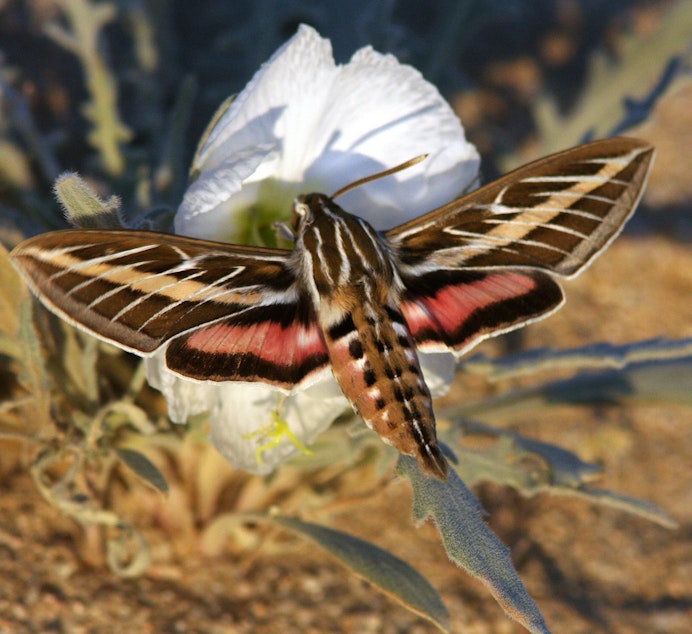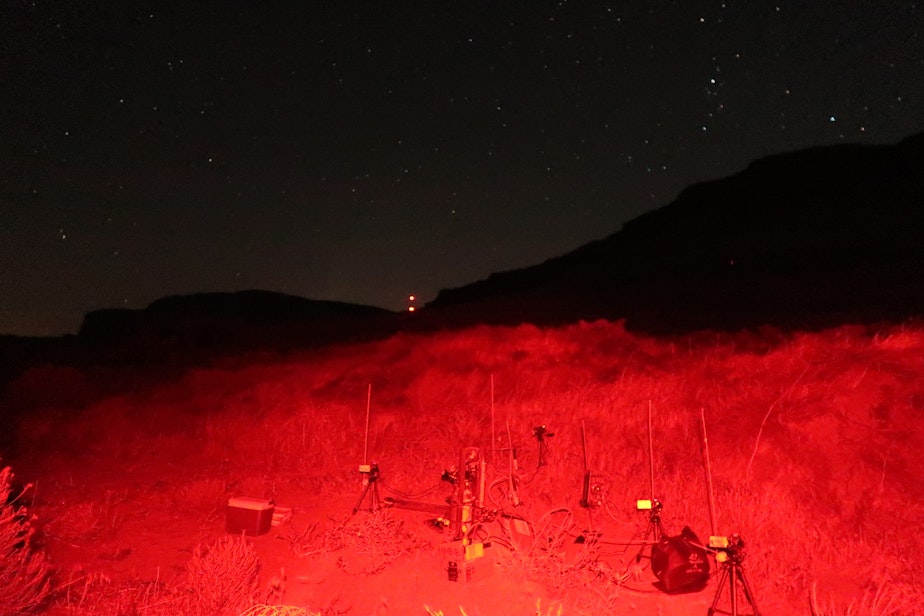Pollution is problematic for pollinators — and perhaps your produce
Air pollution is making it hard for some Washington state flowers to get pollinated, according to a new study in the journal Science.
Exhaust from cars and smokestacks can alter the fragrances that flowers emit to attract pollinators, leaving bees and moths at a loss.
“That degradation of the scent is sufficient enough that these pollinators can no longer recognize the flower,” said Jeff Riffell, a coauthor of the new study and University of Washington biology professor.
The study focused on the pale evening-primrose — a wildflower that grows in the sagebrush country of Eastern Washington and the American West — and two moth species that pollinate the plant. The tobacco hawkmoth and the white-lined sphinx are big and nimble enough that they can be mistaken for hummingbirds.

Sponsored
The evening-primrose is a literal late bloomer: Its white flowers open around sunset, offering nectar to moths and other pollinators that roam at night.
“They use their sense of smell to find these patches of flowers that are oftentimes located miles apart,” Riffell said.
Pollutants called nitrate radicals eat away at the complex chemical signals that flowers offer to moths and bees. The radicals are particularly reactive with monoterpenes, a family of compounds that give primroses much of their sweet smell and evergreen forests much of their piney smell. Sunlight breaks down the radicals, but at night, they waft undiminished.
When researchers exposed moths to evening-primrose scent in a wind tunnel, the pollinators headed for it. But when they mixed the scent with levels of nitrate often found in urban air, the moths often lost the scent. Tobacco hawkmoths’ ability to find the floral fragrance dropped by half and the white-lined sphinxes could no longer find it at all.
“Without that ability, then the plant doesn't get pollinated, and the moth can't find sugar to keep on going,” Riffell said.
Sponsored
Using global air-pollution data, the researchers estimated that the distance pollinators can find monoterpene scent has dropped by 75% or more in most populated areas of the world.
“And even areas like around Seattle that you would think are relatively clean, those levels of pollutants are sufficient enough to really degrade the ability of the pollinators to locate these nice flowers,” Riffell said.
If these findings apply to other flower-pollinator combos, humans could also have a hard time finding food to keep on going.
While some crops are wind-pollinated, most rely on flying pollinators’ abilities to find flowers and transfer pollen from one plant to another.
“This is one study in one environment looking at a limited number of moth species, and therefore, any extrapolation needs to be treated with great care,” Robbie Girling, head of the Centre for Sustainable Agricultural Systems at Australia’s University of Southern Queensland, said in an email.
Sponsored

Girling, who was not involved in the study, said he was shocked at how profoundly pollinators were affected and that basic atmospheric chemistry suggests the pollution-induced changes seen in scents should translate to a broad range of nocturnally pollinated plants.
“Moths are often undervalued as pollinators in natural environments because they pollinate at night, away from human eyes,” Girling said.
The nitrate pollution that is blunting flowers’ fragrances has been decreasing in the United States since the 1990s as federal air pollution regulations have tightened.
Transitioning away from fossil fuel combustion would reduce those pollutants further and help flowers smell sweet again.




